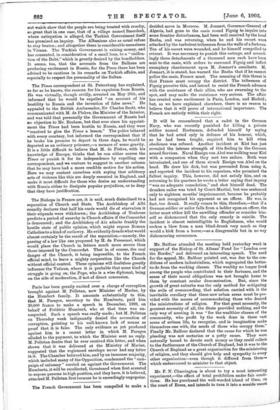It will be remembered that a cadet in the German
Navy, who was recently punished for killing a private soldier named Hartmann, defended himself by saying that he had acted only in defence of his honour, which, as he had been taught, required him to kill when obedience was refused. Another incident at Kiel has just revealed the intense strength of this feeling in the German armed Services. Naval Ensign von Abel was walking near Kiel with a companion when they met two sailors. Both were intoxicated, and one of them struck Ensign von Abel on the head. He drew his dirk, but was prevented from using it, and reported the incident to his superiors, who promised the fullest inquiry. This, however, did not satisfy him, and on returning to his quarters he wrote a letter saying that inquiry "was no adequate consolation," and shot himself dead. The drunken sailor was tried by Court-Martial, but was sentenced only to eighteen months' imprisonment, because he probably had not recognised his opponent as an officer. He was, in fact, too drunk. It really comes to this, therefore,—that if a German soldier or sailor falls from a ladder upon an officer, the latter must either kill the unwilling offender or consider him- self so dishonoured that the only remedy is suicide. The incident is almost unintelligible to Englishmen, who would reckon a blow from a man blind-drunk very much as they would a kick from a horse,—as a disagreeable but in no way dishonouring occurrence.










































 Previous page
Previous page